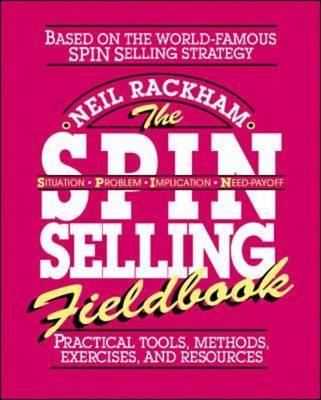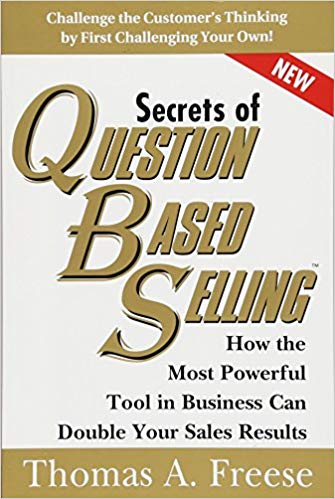Sales Questions
Questions Lead to Content and Direction
Sales questions provide the valuable content for us to listen to.
According to Gong's analysis of 519,000 discovery calls, there's a clear relationship between the number of questions a rep asks and their chances of success.
Likewise the SPIN Selling research indicated that success in big ticket business-to-business sales correlated closely to the number of certain questions asked.
In other words, if you want your discovery call to go well, make sure you're periodically posing questions to the buyer.
(This is article comes from YourSalesSuccess eZine series in the last issue we talked about LISTENING.)
A significant part of listening is your questions and your skill in forming them and delivering them.
The Wolf of Wall Street on Questions
"The real answer is before I’m even going to sell a pen to anybody, I need to know about the person, I want to know what their needs are, what kind of pens do they use, do they use a pen? How often do they use a pen? Do they like to use a pen formally, to sign things, or use it in their everyday life?
The first idea is that when you say ‘Sell me this pen,’ I want to hear [the salesman] ask me a question. ‘So tell me, how long have you been in the market for a pen?’ I want them to turn it around on me and start asking me questions to identify my needs, what I’m looking for.
And if you do that, people don’t know what to do. Next thing, he is answering, and now I’m controlling the conversation, finding out exactly what he needs.”
– Jordan Belfort (The Wolf of Wall Street)
Listening and Question
Of course, asking all the question in the world is useless unless you LISTEN to the answers.
I mean really listen.
Listen with your eyes as well as your ears.
Listen to the tone of voice as well as the words that are spoken.
A Simple Question but Critical
What if there was a simple question to ask that would allow you to know what was important to the customer?
What would it be like to know within the first three minutes of every interview exactly what your client wants or expects from you?
Want to know the question.
Questions Clarify
The idea is to use your sales questions to keep the conversation on track and to increase your understanding of your prospect and their problem.
Let’s assume you are in front of a potential customer.
You have done your homework and found out some details about the company and the person.
You have created some Rapport with the person (and hopefully you have done this in a business context rather than talking about golf or some other non business topic – more on this in a later issue) and the conversation is underway.
The customer tells you that the company requires and is getting excellent service from their current supplier.
I have seen many salespeople just accept that comment without question.
And there is danger in making assumptions when you are selling.
Yet, let me ask the question
"What is “excellent service?"
I’ll guarantee you that if you asked that question to 10 people you’d get 10 different answers.
And let me ask another question
"What is important about “excellent service” or what does “excellent service” do for your business ?"
( We’ll cover the importance of this sales question in a later issue.)
“Excellent service” is an example of a nominalisation.
We create a nominalisation with our language when we turn a verb into a noun and pretend it’s a thing rather than an action. You see, the problem is once we turn it into a noun we often assume that what I understand as “X” is the same as your understanding of “X”.
Generally, this is far from the truth.
This is where quality sales questions can have a big impact.
Let’s take a non-business example.
"Love" is a nominalisation.
It is not a thing.
You cannot put “Love” in a wheelbarrow.
“Love” is something you do, the act of Loving somebody.
In relationships (another nominalisation by the way, it is really the act of relating) this causes many problems when each partner has a different understanding of “Love” .
Lets look at “excellent service”.
You may be thinking that “excellent service” is delivering on-time and in-full.
Your potential client, however, may believe that “excellent service” is having stable prices for 3 years or consignment stock or any one of many other different possibilities.
So what do we do to ensure that we and the prospect stay on the same wavelength ?
We’ll it boils down to asking good sales questions to ensure you share an understanding.
Back in the 70s some linguists developed a communication model to help in this regard (and with some other types of fluffy communicating as well).
The model is know as “The Meta Model” and is sometimes called “The Precision Model”.
When the client suggests they want “excellent service” you need to enquire more to find out what that is to them.
You could ask sales questions like:
How will they know when they are getting “excellent service” ?
What will they see, hear & feel when they have it ?
If we were supplying you with “excellent service” what would we be doing differently to the other potential suppliers out there ?
What will happen if you get “excellent service“ ?
What will happen if they don’t get it ?
What wont happen if they get it ?
What wont happen if they don’t get it ?
So, whenever you here a comment from a client that cannot be specified in reality, something like a nominalisation, something you cannot pick up and put in a wheelbarrow, ask sales questions till you are sure you understand what the client is referring to.
If you want help formulating sales questions for your business feel free to contact me for some sales coaching.
Once you get an answer to these types of questions you are in a much better position to proceed with the sale because you know exactly what the prospect wants.
You can then probe to see if there are additional things you can offer above and beyond the service they currently have.
Remember,
"Whenever we look upon the earth, the opportunities take shape within the problems."
Nelson Rockefeller
As you start probing you are looking to make the prospect aware of what they don’t yet have and could have if they purchased from you.
You need to ask things that are going to make your prospect a little uncomfortable and you may be a little uncomfortable asking them.
You see, if the conversation stays very polite and within the bounds of usual socially acceptable conversation, you're not going to get very far.
But if you don't get to that uncomfortable place, you're just skimming the surface.
Testimonial
Hi Greg,
I am forever grateful for your mission of helping salespeople around the globe to raise the bar of service in this profession through your free articles and sharing of experiences even offering to sales coach.
My perspective about selling raised to a new level since reading some of the articles yesterday... Marcelino
The Three "P"s of Selling
Your job is to uncover the 3 Ps of selling:
Problems, Pains, and Predicaments.
These will give rise to Possibilities
(for you and the prospect ).
However, you need to diagnose before you Prescribe.
You do that by asking good sales questions.
For my summary of two excellent books on Sales Questions...
Click one of the images below
Here's to YourSalesSuccess.

